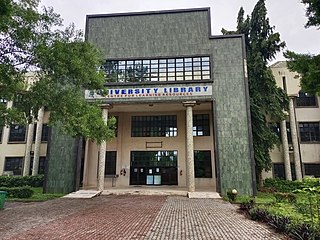Related Research Articles

The Internet Archive is an American digital library founded on May 10, 1996, and chaired by free information advocate Brewster Kahle. It provides free access to collections of digitized materials including websites, software applications, music, audiovisual and print materials. The Archive also advocates for a free and open Internet. As of January 1, 2023, the Internet Archive holds more than 38 million print materials, 11.6 million pieces of audiovisual content, 2.6 million software programs, 15 million audio files, 4.7 million images, 251,000 concerts, and over 832 billion web pages in its Wayback Machine. Their mission is to provide "universal access to all knowledge."

The Library of Congress National Digital Library Program (NDLP) is assembling a digital library of reproductions of primary source materials to support the study of the history and culture of the United States. Begun in 1995 after a five-year pilot project, the program began digitizing selected collections of Library of Congress archival materials that chronicle the nation's rich cultural heritage. In order to reproduce collections of books, pamphlets, motion pictures, manuscripts and sound recordings, the Library has created a wide array of digital entities: bitonal document images, grayscale and color pictorial images, digital video and audio, and searchable e-texts. To provide access to the reproductions, the project developed a range of descriptive elements: bibliographic records, finding aids, and introductory texts and programs, as well as indexing the full texts for certain types of content.

Digitization is the process of converting information into a digital format. The result is the representation of an object, image, sound, document, or signal obtained by generating a series of numbers that describe a discrete set of points or samples. The result is called digital representation or, more specifically, a digital image, for the object, and digital form, for the signal. In modern practice, the digitized data is in the form of binary numbers, which facilitates processing by digital computers and other operations, but digitizing simply means "the conversion of analog source material into a numerical format"; the decimal or any other number system can be used instead.

The National Library of Australia (NLA), formerly the Commonwealth National Library and Commonwealth Parliament Library, is the largest reference library in Australia, responsible under the terms of the National Library Act 1960 for "maintaining and developing a national collection of library material, including a comprehensive collection of library material relating to Australia and the Australian people", thus functioning as a national library. It is located in Parkes, Canberra, ACT.

A music library contains music-related materials for patron use. Collections may also include non-print materials, such as digitized music scores or audio recordings. Use of such materials may be limited to specific patron groups, especially in private academic institutions. Music library print collections include dictionaries and encyclopedias, indexes and directories, printed music, music serials, bibliographies, and other music literature.
Hybrid library is a term used by librarians to describe libraries containing a mix of traditional print library resources and the growing number of electronic resources.
The California Digital Library (CDL) was founded by the University of California in 1997. Under the leadership of then UC President Richard C. Atkinson, the CDL's original mission was to forge a better system for scholarly information management and improved support for teaching and research. In collaboration with the ten University of California Libraries and other partners, CDL assembled one of the world's largest digital research libraries. CDL facilitates the licensing of online materials and develops shared services used throughout the UC system. Building on the foundations of the Melvyl Catalog, CDL has developed one of the largest online library catalogs in the country and works in partnership with the UC campuses to bring the treasures of California's libraries, museums, and cultural heritage organizations to the world. CDL continues to explore how services such as digital curation, scholarly publishing, archiving and preservation support research throughout the information lifecycle.
A bibliographic database is a database of bibliographic records. This is an organised online collection of references to published written works like journal and newspaper articles, conference proceedings, reports, government and legal publications, patents and books. In contrast to library catalogue entries, a majority of the records in bibliographic databases describe articles and conference papers rather than complete monographs, and they generally contain very rich subject descriptions in the form of keywords, subject classification terms, or abstracts.
The Digital Library of Georgia (DLG) is an online, public collection of documents and media about the history and culture of the state of Georgia, United States. The collection includes more than a million digitized objects from more than 200 Georgia-related collections. The DLG connects users to content from 65 libraries, archives, museums, historical societies, and other institutions, as well as 100 agencies of state government. It can be searched or browsed through the Digital Library of Georgia website.
Music librarianship is the area of librarianship that pertains to music collections and their development, cataloging, preservation and maintenance, as well as reference issues connected with musical works and music literature. Music librarians often have degrees in both music and librarianship. Music librarians deal with standard librarianship duties such as cataloging and reference, which become more complicated when music scores and recordings are involved. Therefore, music librarians generally read music and have at least a basic understanding of both music theory and music history to aid in their duties.
Chronicling America is an open access, open source newspaper database and companion website. It is produced by the United States National Digital Newspaper Program (NDNP), a partnership between the Library of Congress and the National Endowment for the Humanities. The NDNP was founded in 2005. The Chronicling America website was publicly launched in March 2007. It is hosted by the Library of Congress. Much of the content hosted on Chronicling America is in the public domain.
A digital library, also called an online library, an internet library, a digital repository, a library without walls, or a digital collection, is an online database of digital objects that can include text, still images, audio, video, digital documents, or other digital media formats or a library accessible through the internet. Objects can consist of digitized content like print or photographs, as well as originally produced digital content like word processor files or social media posts. In addition to storing content, digital libraries provide means for organizing, searching, and retrieving the content contained in the collection. Digital libraries can vary immensely in size and scope, and can be maintained by individuals or organizations. The digital content may be stored locally, or accessed remotely via computer networks. These information retrieval systems are able to exchange information with each other through interoperability and sustainability.

Archival research is a type of research which involves seeking out and extracting evidence from archival records. These records may be held either in collecting institutions, such as libraries and museums, or in the custody of the organization that originally generated or accumulated them, or in that of a successor body. Archival research can be contrasted with (1) secondary research, which involves identifying and consulting secondary sources relating to the topic of enquiry; and (2) with other types of primary research and empirical investigation such as fieldwork and experiment.

Trove is an Australian online library database owned by the National Library of Australia in which it holds partnerships with source providers National and State Libraries Australia, an aggregator and service which includes full text documents, digital images, bibliographic and holdings data of items which are not available digitally, and a free faceted-search engine as a discovery tool.
A memory institution is an organization maintaining a repository of public knowledge, a generic term used about institutions such as libraries, archives, heritage institutions, aquaria and arboreta, and zoological and botanical gardens, as well as providers of digital libraries and data aggregation services which serve as memories for given societies or mankind. Memory institutions serve the purpose of documenting, contextualizing, preserving and indexing elements of human culture and collective memory. These institutions allow and enable society to better understand themselves, their past, and how the past impacts their future. These repositories are ultimately preservers of communities, languages, cultures, customs, tribes, and individuality. Memory institutions are repositories of knowledge, while also being actors of the transitions of knowledge and memory to the community. These institutions ultimately remain some form of collective memory. Increasingly such institutions are considered as a part of a unified documentation and information science perspective.

Qatar National Library (QNL) is a non-profit organization under the umbrella of the Qatar Foundation for Education, Science and Community Development. The plans for the new national library were announced by Sheikha Moza bint Nasser, Chairperson of Qatar Foundation, on 19 November 2012, during a ceremony celebrating the 50th anniversary of the Dar Al Kutub Library, in Doha, Qatar, one of the first public libraries in the Persian Gulf region, which had until then been regarded as the national library of Qatar.
The Australian National Bibliographic Database (ANBD), formerly part of the Australian Bibliographic Network (ABN) and for some years renamed Kinetica, is a national shared library cataloguing network, hosted by the National Library of Australia. It commenced in 1981 in Australia as the ABN, and after a series of rebrandings and added services, has since 2006 been available through Libraries Australia. In mid-2019, Libraries Australia partnered with Trove, and as of June 2020 is set to be co-branded with Trove.

Marie-Louise Ayres is a librarian whose work has centered on providing digital access to cultural resources throughout Australia. Since 2017 she has been the Director-General of the National Library of Australia.
National edeposit (NED) is a collaboration between Australia's nine national, state and territory libraries which provides for the legal deposit, management, storage and preservation of, and access to, published electronic material across Australia. It is a website, a system and a service, the result of a project by National and State Libraries Australia, and is a world-first collaboration. The National Library of Australia (NLA), Libraries ACT, Libraries Tasmania, Northern Territory Library, State Library of New South Wales, State Library of Queensland, State Library of South Australia, State Library Victoria and the State Library of Western Australia are the member organisations, while the system is hosted and managed by the NLA.

Covenant University Library, also known as Centre for Learning Resources (CLR), is the library of Covenant University in Ota, Ogun State, Nigeria. It is housed in a three-story glass building with a seating capacity of 3,500.
References
- ↑ "Music Australia - Australia's Music: Online, in Time". Music Australia. Archived from the original on 6 June 2012.
This article includes a list of references, related reading, or external links, but its sources remain unclear because it lacks inline citations .(April 2009) |
- Robyn Holmes and Marie-Louise Ayres. “Australia’s music: online, in time”. National Library of Australia news, May 2005.
- Robyn Holmes and Marie-Louise Ayres. “Music Australia: Towards a National Music Information Infrastructure”. 5th International Conference on Music Information Retrieval Proceedings. Audiovisual Institute Pompeu Fabra University, Barcelona, 2004.
- Marie-Louise Ayres. "MusicAustralia: Building on National Infrastructure". VALA 2004 Conference, Melbourne, Feb 3-6 2004
- Roxanne Missingham. "A New Strategic Direction for the National Library of Australia". Alexandria, 16 (1): 37-48
- Debbie Campbell. "Easy To Do: A brief history of federated harvesting in Australia". ETD 2005 conference, 30 September 2005.
- Marie-Louise Ayres. "Case Studies in implementing Functional Requirements for Bibliographic Records[FRBR]: AustLit and MusicAustralia",ALJ: the Australian Library Journal February 2005, vol 54 no 1, pp 43–54
- Warwick Cathro. "Digitization in Australasia". Serials: The Journal for the Serials Community, V.20, No. 1, March 2007, p. 9 - 15